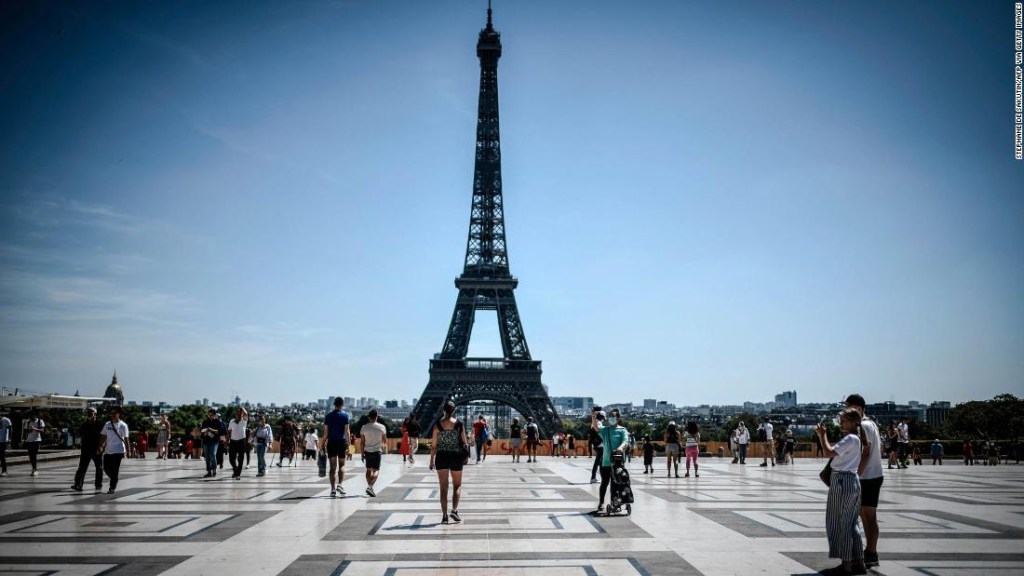Da Vinci's mural that symbolizes tourist reactivation 0:49
Paris (CNN) -
In France, summer vacations are sacred.
So much so that the government is willing to bend its own vaccination policy against covid-19 so that French workers can go to the beach without worrying about their second dose.
Until it was decided, public outrage at the prospect that rigid vaccination plans could jeopardize people's summer getaways was enough to shut down one of France's biggest divisions: the "juilletistes," who vacation in July, and the "aoûtiens", who prefer to do it in August.
To appease these ardent vacationers, authorities agreed to remove guidelines that insisted that second doses of the Covid-19 vaccine should be received in the same place the first was received.
Now people can choose the places, including the most popular vacation destinations.
The preference of the French to vacation in one month or another may seem like a mere curiosity to the rest of the world, but for those who live there it is a serious matter, which each year paralyzes the entire nation.
For anyone thinking of visiting France in the summer months, it's also worth taking note, especially if you don't want to find your favorite Paris restaurant closed for weeks, or if you want to avoid one of the world's biggest traffic jams.
To understand why some French people prefer the August holidays and others the July holidays is to advance in the understanding of what it is to be French.
advertising
"Everyone in France is looking forward to the summer holidays," says Julien Louap, a 30-year-old aoûtien.
"It's like Christmas but in summer."
For Louap, a proud Parisian, the reason August is better than July for the holidays is simple: Paris is too exciting to leave in July.
Every year, the city organizes a great fireworks show for July 14, the French national holiday, accompanied by public events and private parties.
Fireworks on the beach
This year, the French traffic information services foresee 700 kilometers of traffic jam.
When August arrives, the city is invaded by another sensation: calm.
Most of the city's residential areas empty as residents go on vacation, giving Arthur Cuhel, a 26-year-old, another reason not to go on vacation in July.
Cuhel doesn't want to return from his vacation at the end of July to an empty city and get stuck at work while most of his colleagues are away enjoying their August leisure time on the beach.
In addition, for him August also means better weather, guaranteed sunshine.
"In July there are fewer people," says Cuhel.
"But the weather is also worse and I need the sun."
But for many juilletistas, a less crowded beach is more valuable than a sunnier and warmer one.
Plus, celebrating July 14 on an empty, laid-back beach is just as fun as throwing a party in Paris.
"You have fireworks on the beach," says 21-year-old Juliette Gache.
"While by August 15 it is usually full."
China's tallest hotel opens, J Hotel Shanghai Tower
The cost of going on vacation in July is also lower, as the demand for hotel rooms is usually lower than in August.
Vacationers in France booked 23.4 million nights in July compared to 24.8 million nights in August in the summer of 2019, the last pre-pandemic summer vacation season, according to a study published by the National Institute of Statistics and Economic Studies of France.
Despite being divided on many fronts, Juilletistes and Aoûtiens can agree on one thing that none of their months is good: the traffic.
"Traffic jams are kind of a tradition," says Gache.
"Even if you leave your house at four in the morning, which my family usually does because we are psychopaths, you will always end up in a traffic jam."
The "jam of the century"
Paris is usually quieter in August, when many locals evacuate the city.
Being trapped in a tiny vehicle, sometimes without air conditioning, with three or four other family members on the A7 motorway is a childhood memory shared by many French people.
This motorway, which links the French cities of Lyon and Marseille through the Rhone river valley, is nicknamed "the motorway of the sun" as it leads to the sunny Côte d'Azur.
"The Rhone river valley is very hot in the summer," says Lilian Delhomme, a 24-year-old youth player.
"You die and then you come back to life when you are on the beach."
France's most infamous annual traffic jam happens each year on the Saturday of the week July meets August.
It is the day when the Juilletistes who return collide with the Aoûtiens who leave, causing traffic jams throughout the country, called the "crossing traffic jam".
"This year, as in previous years, we expect more than 700 kilometers of traffic jam," explains Fabrice Vella, head of forecasts at Bison Futé, "Búfalo intelligente" in Spanish, the traffic information service of the Ministry of Transport of France.
They arrest the woman who allegedly caused the accident of the Tour de France
In fact, the traffic service was created as a result of a serious traffic jam, that of 1975, called "the traffic jam of the century".
On August 2, 1975, the 800-kilometer national highway 10, which then connected Paris to Spain, hit a maximum traffic jam of 450 kilometers, meaning that more than half of the highway was blocked by traffic.
Currently, Bison Futé uses a four-color rating system to indicate the level of congestion, with green at the good end and black at the bad end.
In France, there are only one or two "black days" a year when the whole country is covered in black, and usually the day of the crossing is one of them, according to Vella.
The city comes to a standstill
One of the main reasons for the French passion for summer vacations is that French labor law guarantees five weeks of paid vacation to most of its workers.
In fact, France was the first European country to introduce a generalized two-week paid vacation in 1936, under the socialist government of Léon Blum, according to Alain Chatriot, a professor at Sciences Po University.
Cruising was a covid disaster.
Now they claim to be the safest vacation available
In the summer of 1936, for the first time hundreds of thousands of French factory workers hit the beach and enjoyed their vacations, a privilege formerly reserved for the bourgeoisie and aristocracy.
"It remains one of the most symbolic provisions of labor law," says Chatriot.
The French's love of vacations also means that American tourists planning to visit Paris this summer, especially in August, will find most restaurants and cafes closed.
What happened when two strangers decided to go on vacation together?
Cyril Choisne, 40, is originally from Paris and has been working in the gastronomic world of the French capital since 2006. Eclipses, his own restaurant recommended by the Michelin Guide near the Musée d'Orsay, as do most of the restaurants in Paris , closes its doors during the first half of August because most of its customers have left.
"Last year I tried to open from August 1 to 15," he explains.
Demand "fell more than 90%."
But for Choisne, tranquility is precisely why she encourages everyone to visit her hometown at this time of year.
You just have to remember one thing, he said, "always carry a bottle of water and bear in mind that it will be difficult to find a bathroom because most of the city will be paralyzed."
France












/cloudfront-eu-central-1.images.arcpublishing.com/prisa/KMEYMJKESBAZBE4MRBAM4TGHIQ.jpg)


